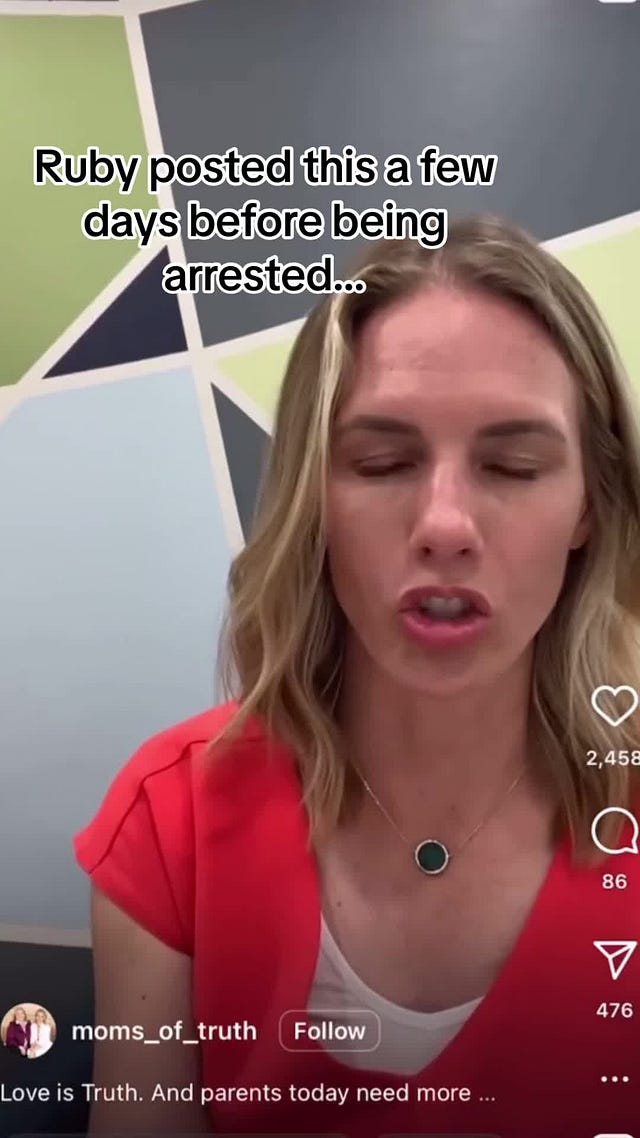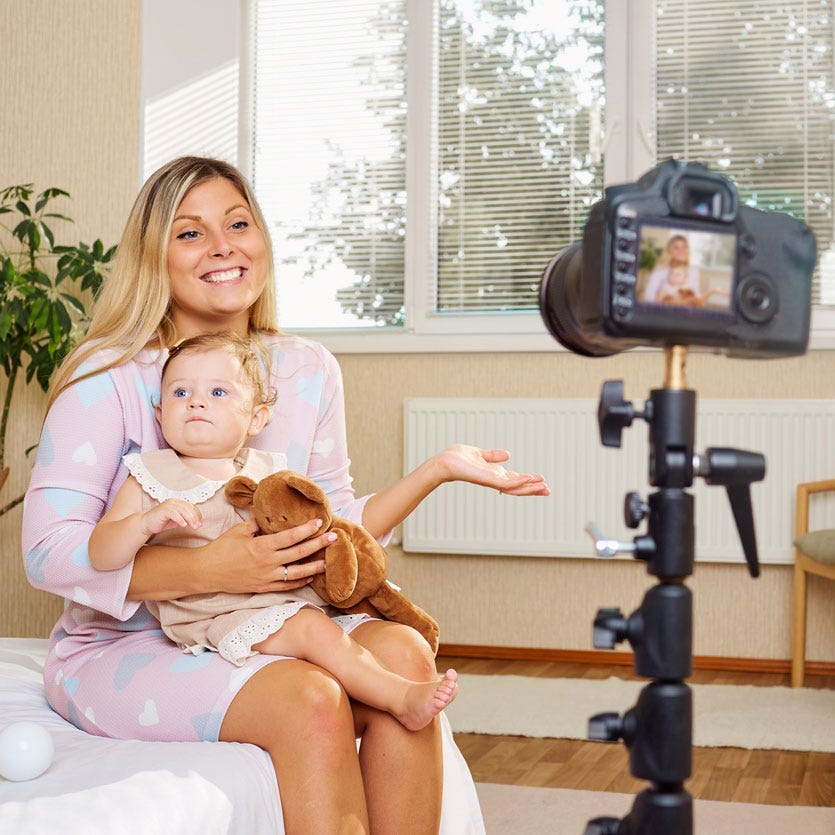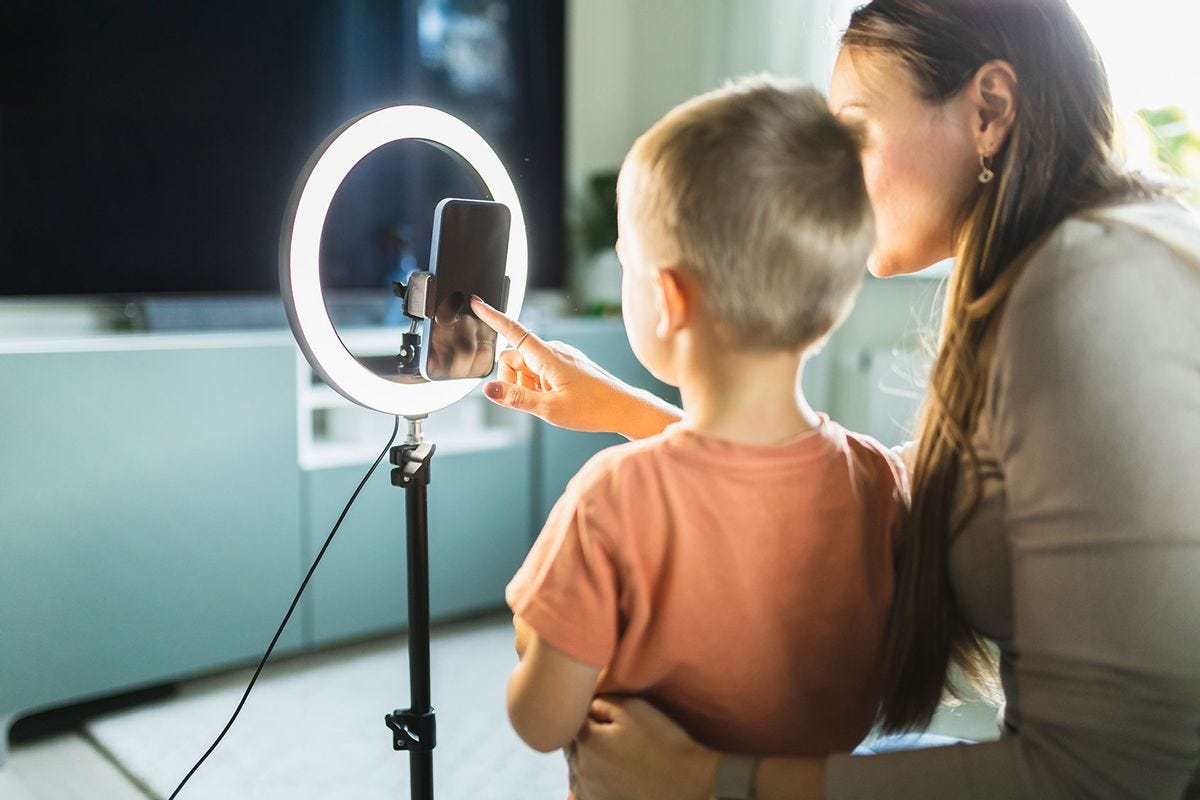There Are No Ethical Momfluencers
Ruby Franke's arrest is an extreme case, but we should think more about what even 'good' influencers do to their kids
Until recently, Ruby Franke was one of the larger momfluencer accounts on YouTube. She amassed more than 2.3 million followers at her 8 Passengers1 channel, sharing her life with 6 kids, chronicling her parenting style, and frequently drawing criticism for that style. She was known for extremely ‘tough love’ parenting filled with right wing/religious rhetoric - so much so that critics said she was abusing her children.
What kind of parenting would garner that kind of criticism? Ruby once pulled two of her six kids out of school to wash floors all day as punishment for vaguely defined attitude problems. When they didn’t seem sorrowful enough about the situation, she took away all their Christmas presents and forced them to watch their siblings open presents Christmas morning while they got none.2 She took away one son’s bedroom for seven months, forcing him to sleep on a bean bag in a family room. The same son was sent for months to a ‘wilderness behavioral camp’ as punishment. She made her 6 year old daughter pack her own school lunches - and when the daughter forgot one day, she refused to bring her daughter food and said that she hoped nobody else would feed her either so that she would learn. I’ll stop there, but there are an abundance of videos highlighting more of the worst stuff - if you really need more you can find deep dives here or here.
At some point (perhaps in response to criticism) the entire channel was taken down. But Ruby wasn’t gone - she simply graduated to a different channel and a different business selling herself as a parenting coach with a new company ConneXions. The company seems to be selling the same brand of harsh parenting that her 8 Passengers channel documented. This video posted to TikTok two weeks ago is a good example - it’s supposedly about what you would do if you kid was on fire, but it becomes clear as she progresses it’s really about beating your child if they come out to you as gay.
Last week, Ruby Franke was arrested on suspicion of child abuse. She seems to have graduated from abusive practices to straight-up torture, and the details are horrifying.
One of her children escaped out a window, and went to a neighbor’s house asking for food and water. When I say ‘escaped’, that’s not metaphorical - the child had duct tape still around their wrists and ankles. The child had visible rope marks and lacerations on their skin. They were dehydrated, emaciated, malnourished and covered in wounds. Their condition was so bad that they required a stay in the local hospital. Listening to the 911 call, you can hear the neighbor getting emotional at the state of the child who’s begging him for help.
Franke and her ConneXions business partner Jodi Hildebrandt were both arrested - the abuse seems to have have happened at Hildebrandt’s house and with her knowledge and approval. After finding additional children in a similarly malnourished state, Franke’s children were all taken into protective custody by child services and both Hildebrandt and Franke have since been charged with six counts of felony child abuse.
In my essay The Wreckage of Virality, I pose a pretty direct challenge to everyone who consumes terrible social media content. Audience demand is the ultimate reason that content exists. Quoting that piece:
You’re now 1400 words into an account of a nine-year old’s social media career. You clicked the link. You’re the one consuming this content. You all, in the collective sense, are the ones who make these children famous. You’re the followers, the commenters. You’re the ones who can’t get enough of dramatic stories, online beefs, and shocking social media antics. You provide the incentives for Lil Tay to exist. If Claire Hope hadn’t become Lil Tay, someone else would have. So maybe the blame lies with you.
I don’t think that same critique applies to the damage caused by Ruby Franke. Franke is at the extreme end of terrible outcomes for momfluencers. She’s a disturbed individual who likely would have abused her kids in any scenario, and I hardly think it’s fair to blame social media or the audience for what happened here.
But beyond Franke, there’s a whole industry of mommy bloggers, family YouTube channels, and content that focuses around family units, moms and their children. One of the lessons I wanted to emphasize in the Wreckage of Virality piece about social media harm is that it extends beyond the obvious:
For every person who gains social media fame, there are hundreds or thousands who tried and failed. The nature of modern social media systems is winner-take-all. A tiny group of people will become unbelievably, unfathomably famous. A much larger group will try for fame but fail. Claire Hope’s life might have been lost in the wreckage of virality, but that wreckage extends far further than we can see. How many other teenagers have ruined their lives in ways small and large trying to go viral? How many families have been torn apart by fights over how to seek fame? And how much of that wreckage has happened without the victims having even a little bit of success to make it worthwhile? The answers here are much larger than I’m comfortable with.
Even in cases where the children aren’t being horribly abused, there are ethical questions about the nature of the content being created. The damages from seeking social media fame are often subtler than outright abuse, especially when it comes to kids. Once again we need to consider why we consume this content, and whether we as the audience bear any responsibility.
I’ve been thinking about the topic of kids as social media content creators for a while, and I’ve come to the conclusions that mommy blogs, vlogs and momfluencers are inherently unethical. Let’s talk about why.
Let’s start with the basics. No child can meaningfully consent to being in pictures, videos, etc. This is because children (and especially young children) can’t really consent to anything. Of course, parents still have to do parenting stuff. Your kid can’t ‘consent’ to eating vegetables, bedtime, or going to school, but parents still force them to do those things. And that’s fine. For the most part we trust parents to be sane and only make their kids do things that are necessary or normal. Plenty of parents take pictures and videos of their kids but aren’t crazy, and this generally works.3
This sort of informal norm works because most people are reasonable, and because actually trying to come up with formal rules for what kind of videos you can take of your kid would be impossible. The line of ‘what is exploitation’ is inherently gray and fuzzy. Things that might be ok in one instance might be wrong in another. So why do mommy blogs and family vlogs seem so terrible? While the boundary between normal and exploitative is fuzzy, there are a few distinct features of mommy blogging that make it particularly bad:
First: We should distinguish between lowercase content and capital-C Content. It’s one thing to create social media content around your kids when the purpose is just to document a fun vacation, or share some videos and pics with family and friends. It’s a much different thing to create Content based around your children with the goal of fame and income. The two things are not alike, and anyone who’s watched these YouTube channels knows the difference. Forcing your kid to be part of the way that the family earns money is obviously ethically fraught. Forcing your kid to participate in your Content to get famous is weird and wrong.
Second: Lack of regulation. Child actors have always existed since video content began 100 years ago. That space is filled with its own stories of abuse, but I’d still rather be a child actor than the child of a momfluencer. Children working in the actual entertainment industry are protected by regulations on how long they can work, what they can be made to do, etc. The sets of TV shows and movies aren’t perfect, but there are basic guard rails that all major players in the industry uphold (for the most part). Children who are the focus of a momfluencer’s Content have no such protections. All day every day can be filming time, and there’s nobody that can make it stop.
A related point is the lack of privacy in a child’s personal life. Children on TV sets are playing a role, a character. They perform on a set, and then they get to go home to a space where the cameras are off. Momfluencer kids are always on - their videos aren’t playing a fictional character, but documenting their actual lives. Imagine what it would be like to be a pre-teen or teen, knowing that your parents film your most embarrassing moments and broadcast them to the entire world. You got punished for bad behavior? You used tampons for the first time? You peed the bed? You had a private moment you didn’t want people to see? All fodder for the Content Mill. I cannot imagine a worse hell than being a middle school kid whose parent just posted an embarrassing video online to their millions of followers.4
Third: At the end of the day, the kid being exploited for content doesn’t even own the content. They’re doing the work, their privacy is suffering, but they’re not becoming the star. In almost every case the parent (usually the mom) is the star. At least when they exploited Lil Tay they made HER famous, instead of making her do all the work while the mom becomes famous.
It’s worth emphasizing again that the kids can meaningfully consent to none of this. They have no way out, no way to stop their parents from filming them, no way to prevent the oversharing. Even for the momfluencers who seem normal, the internet is filled with stories about how their kids hate being part of the content but feel trapped.
Even worse than not being able to stop it from happening - the kids also instinctively realize that the family relies on the money from the YouTube videos, so there’s massive guilt that comes along with their resentment. If they stop appearing in videos, the whole family suffers. Their relationship with their parents turns from parent/child into employee/boss, and it’s not an employee/boss relationship that you get to clock out from at the end of the day. You’re no longer your own person, you’re a character in your mom’s 24/7 internet show about your family. Even for the very best and most thoughtful content creators - the ones who work hard to not show much of their kids and only relay stories second hand - the kids will still operate with knowledge that anything they say or do might become a story sent out to a massive number of strangers.
Constantly mining your kids for content, day in and day out, is simply a fucked up thing to do that corrupts the basic parent/child dynamic. There is no getting around that basic truth. It’s ironic that so many momfluencers lean into trad-wife, religious, or vaguely right-leaning politics because on a fundamental level they’re failing the trad value of ‘treat your child like a child whom you treasure’ and substituting the value of ‘children are a source of content to be mined for dollars and clout’.
Ruby Franke is a pretty extreme case. But while few momfluencers are as insane as she is, I think it’s worthwhile to reflect on the category more broadly, and the ethics of it all.
Is it possible, in any way, to make non-exploitative family influencer content? In theory, sure, just like how in theory you could zig-zag across a minefield without ever stepping on a mine. But in practical terms, that’s not going to happen. Something’s going to blow up.5 Virtually all of these momfluencers are exploiting their children. The ‘good’ ones are careful and thoughtful and are only doing a little bit of exploitation that the kids can probably roll with. The majority of momfluencers are doing a lot more than that, and probably are causing permanent damage.
There are no clean conclusions I can draw about what to do here. I’m skeptical that regulations could really help. The ethical lines are so incredibly fuzzy and gray that it would be impossible to set down clear rules that wouldn’t immediately be abused and stretched and violated. And even if you could set perfect rules for what content kids can be in, enforcement is going to be nearly impossible.
But I do think that moving forward, we should err on the side of shunning this kind of content. I don’t think people should watch it or participate in it. I think in our personal lives we should err on the cautious side of not sharing too much of our kids to the wider social media world. By all means, share pics and videos with your small network. But people underrate the scale social media provides. They underrate how strong incentives to post can be. And they underrate the potential harms from posting. We should be far more thoughtful about those harms that ‘family content’ imposes on the families involved.
Unfortunately, the channel was taken down permanently months ago so there’s no easy way to directly link to Ruby’s content in most instances. We’ll be referencing clips and videos saved on various subreddits and forums as they’re available.
She told them their gift was ‘the love of their parents’ and explained that because their parents loved them, they were making them hurt so they would ‘repent their actions’.
As an aside - there are a growing number of parents who don’t post any pictures of their kids (with varying degrees of strictness) to social media.
And even worse than the video being seen by millions of people, it was seen by dozens of people at your school.
To extend the minefield metaphor - there are also valid reasons why someone might need to cross a minefield, regardless of the risk. There are rarely reasons it’s important to post Content of your kids.








"As an aside - there are a growing number of parents who don’t post any pictures of their kids (with varying degrees of strictness) to social media."
I see this a lot with very online types, especially left-of-center folks—photos of kids with emojis over the faces, for example—but I don't really see it happening with people I know in real life. Like you mentioned earlier in the article, most people are reasonable about this, even coming from the opposite angle. Photos of kids birthday parties? FIne. Video of their reactions if no one comes to their birthday party? Gross and psycho. Every so often a video goes viral because it shows some poor kid in a sad situation and draws a lot of sympathy for the kid, and I'm glad they are able to get some positive vibes sent their way, but I cannot help but wonder who the deranged parent is on the other side of the camera who is *continuing to record* while their child is suffering some profound emotionally painful moment.
I'll go as far as to say child actors are messed up too. I read I'm Glad My Mom Died by a former child actress Jeanette McCurdy, soon after becoming a parent, and realized that while you can try making it as ethical or noncoercive as you can, the problem is performing emotions. Kids are still learning how they feel about things and how to reconcile their emotions with situations with other people. When you make them perform, you're messing with that learning process. If they are made to show emotions on demand, or pretend to be someone else for extended periods, or cry on demand, or pretend to be romantic with someone they don't have romantic feelings for, it messes with their learning to interact with their own emotions. At least with film acting, there are some boundaries, i.e. it's not in the setting where you live your life or situations that you experience day to day. Social media performance doesn't even have those boundaries.
I used to joke about having my kid be a child star so we don't have to worry about paying for college, but now I don't even want my kid acting more than in a school play.